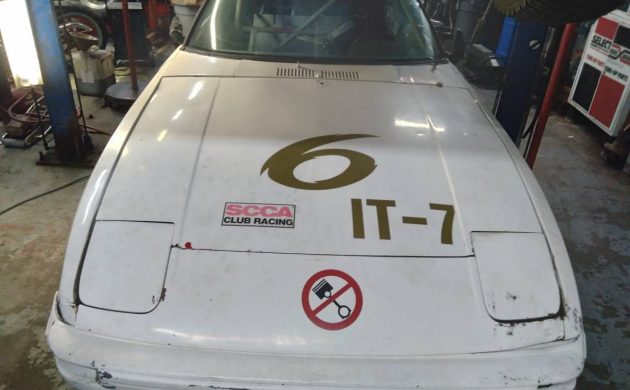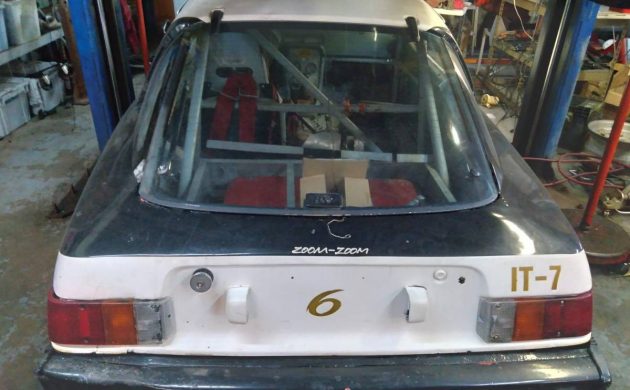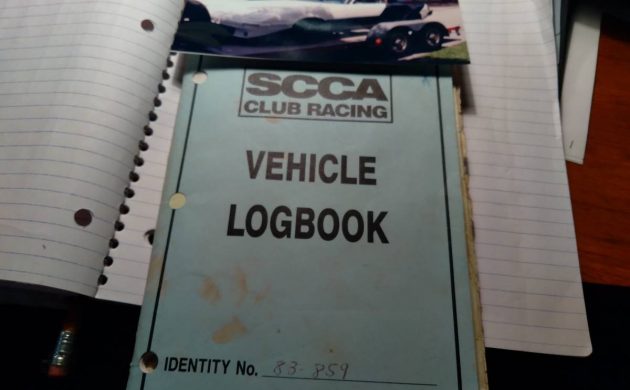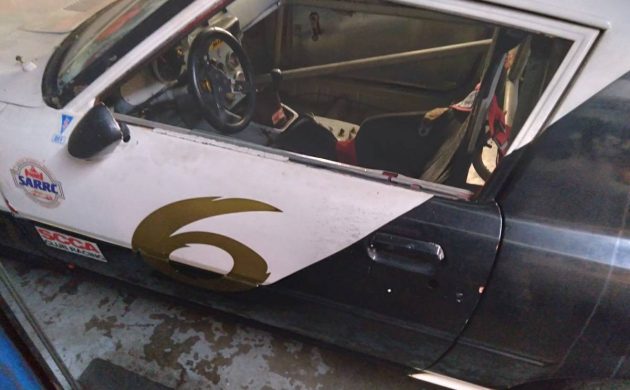Old race cars: what’s the verdict on these? I feel like a certain number of years has to pass for them to achieve eternal cool status, and this 1984 Mazda RX-7 is just on the cusp of transitioning from a forgotten project to a track car worth reviving. This first generation “FB” model RX-7 was known for being light and frankly noisy as hell with its raucous Wankel rotary engine under the hood, so they were natural fits as track day cars and autocrossers. To this day, you can still find first-generation models chasing cones on hot parking lots across the country, which may be an option if you choose to revive this RX-7 track car. Find it here on craigslist in Florida for $5,000.
Now, given it sports the modern era Mazda branding slogan of “Zoom Zoom” on its rear hatch, it’s possible this RX-7 was still used up until recently. The seller doesn’t detail what sort of history it has or whether it was used for road courses or parking lots, but it appears to have been built with professional-grade use in mind. The listing is short on details but mentions that the RX-7 comes equipped with a full roll cage and suspension modifications, along with spares including an extra transmission, axles, rotors, and more. The seller’s location in Fort Pierce puts it within driving distance to tracks at Daytona and Sebring, along with any number of Grassroots Motorsports driving events.
Although there’s no mention of it, the seller does include a photo of the SCCA log book, which is somewhat essential for future owners looking to continue the RX-7’s track dusting ways. The log book documents the car’s competition history, along with the improvements made to confirm it is ready for track use – things like roll cages, fire suppression, seats, and more. The next owner uses this as sort of a roadmap for what’s been done to the car and when, along with its performance in various track events. If you’re looking to continue racing, it’s a huge value-add to have this accompany the car to understand where improvements or updates may need to be made in the future.
The seller doesn’t detail engine health or a history of prior rebuilds, but one would hope that the RX-7 has been looked after enough that the next owner isn’t facing a massive overhaul just to head out to the local autocross. Of course, for $5,000, you’d expect to find more than a rolling chassis upon visiting this Florida workshop. Vintage race cars rarely go out of style, but the history and quality of the upgrades make a big difference. Assuming the seller isn’t a novice racer, they should be able to detail what the car needs and what upgrades have been made – and if it’s like any other RX-7 I’ve seen at the track, it should be a ton of fun to hustle around curves and cones.






If this hasn’t been run in some time,you’ll need to
go through it.
I found a 1980 Ford Fiesta that was raced at one
time,but has been sitting for a while.I’d love to get it,but
I’m afraid of what the total cost would be,& not sure just
how competitive it’d be now.
You don’t drive vintage racecars to be “competitive”. What’s wrong with you? Also you will be amazed how cheap cars can be fixed when you do it all yourself. Check writers are always the ones that fail at restoring cars because they are constantly paying someone else to do it rather than teaching themselves.
Of course you drive vintage race cars to be competitive; same as any other racecar.
With the increasing popularity in open track days this is the sort of car that is perfect for someone looking for an entry level car who wants to accumulate as much seat time as possible on a budget.
Steve R
I am pretty sure that is an earlier version and not a 1984. I had a 81 back in the day and I remember the back end being different. This looks to be a 79 or 80 if I am remembering correctly.
I had an ‘81 and my brother had a ‘79. This car is a ‘78/‘80 but still very cool.
couple of problems with this particular car. #1 it isn’t a 1984 Rx7 it would be a 1979 or 1980 chassis. The depression between the taillights and the taillights give it away. Some of the bodywork has been changed to that of the 1981-5 vintage Rx7s but since “race-car” that wouldn’t be unusual. #2 I could be wrong on this but would need an SCCA expert to say, but IIRC numbering convention on the SCCA log-book giving this a number 83-859 would indicate it was initially “Tech-ed” in 1983 while an1984 chassis could very well have been acquired and built in very late 83 the cost likely-hood is exceptionally prohibitive additionally most of the classes getting that level of manufacturer support where running tube frame chassis at that point. I have no evaluation of the pricing or quality of the build just the observations from this article and the images provided.
That’s why a car like this is perfect for open track days. “Classes” are based on experience and how fast a car is, then you run your pace, it’s not a competitive “race”. It’s about logging laps at a pace you feel comfortable with. The cars just need to pass a safety inspection before hitting the track.
Steve R
Steve my problem it wasn’t accurate. It used to be (not sure anymore) that 79 and 80 chassis weren’t useable in some SCCA classes. Just raises red flags when something that evident pops up. Kind of what else is left out esp when last week there was a full on ex IMSA 79-80 GTU rx7 that sold as a roller but with an engine(unk cond) and some unique MFR (mazda factory racing) parts for 8k. Just asking for accuracy, BUT YES great track day cars.
The first 3 numbers in a SCCA logbook refer to the region that issued the logbook, not the year. For example, I’m from St. Louis and St. Louis Region SCCA is region #21, so all logbooks issued by them start with 021-XXXX. While I do not know what region is 83, I do know the numbers are in order of existence, thus St. Louis Region was the 21st SCCA region. I believe 83 is one of the Florida regions but would have to do some hunting to find out for sure. The SCCA website would tell the tale for sure.
Love the “no piston” decal on the front.
I drove a 79 back in 81 that had a bad fuel pump. The guy that owned it was really cool and said “When you get done run it around and make sure it’s good to go” This to a snot nosed 16 year old kid. I racked it and found a Stewart Warner fuel pump and a weird header pipe on it. I got a new pump on it and set it back down. I popped the hood and found a 750 Holley carb on it. My boss and I took it for a test ride and I have to say it was some car. The owner was happy and so was I.
Located in Fort Pierce, FL
No piston decal on the nose should be replaced by a “No Future” one. The rotary engine is irrelevant now.
Isn’t Mazda bringing back the Wankel engine as some sort of a range extender for an electric car?
I don’t know why you say that RX7s are “noisy as hell”. I’ve had my 1984 GSL since 1988. It’s as quiet as any other unmodified regular car and quieter than most. I even changed out part of the exhaust. Yeah, if you runs straight pipes they’re really noisy, but what engine isn’t.